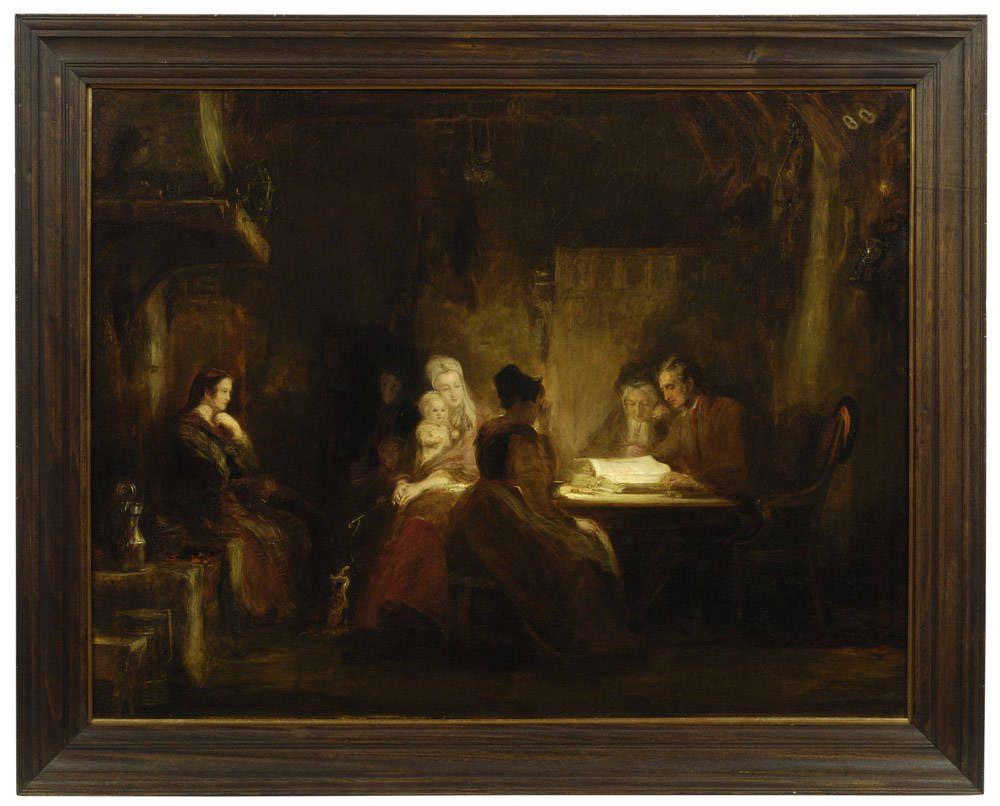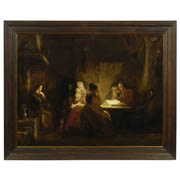Details
- Object type
painting
- Title
The Cottar's Saturday Night
- Artist/Maker
David Wilkie artist
- Culture/School
Scottish
- Date
1837
- Materials
oil on panel
- Dimensions
framed: 1035 x 1285 x 66 mm;unframed: 838 mm x 1080 mm
- Description
-
This important painting by Scottish genre painter David Wilkie shows a family group reverently gathered around the Bible in a humble cottage lit by candlelight. The father, apparently modelled on the artist’s brother Thomas, has respectfully removed his cap, which sits on the back of his chair, and reads, as the extended family quietly listens. Even the baby appears rapt. The older woman, sitting to the right of the father, leans in closely so that she can hear; she holds an ear trumpet to her ear suggesting that she suffers from hearing loss. The woman in the foreground has stopped her work, her needlework scissors laid on the table in front of her; her eyes are closed and she sits with her hand to her head as she concentrates. A fiddle hangs on the wall in the background, indicating that this is not the time for gaiety or pleasure, but serious contemplation. Only a young man, who stares at one of the daughters, and a young boy, who dangles a string for a kitten to play with, are distracted. There is always an element of humour and anecdotal detail in Wilkie’s paintings.
It is significant that these two latter figures are kept in the shadow. The artist skilfully manipulates light and shade to create a mood of quiet reverence and intimacy. Light falls on the Bible’s open pages and on the faces of those listening, suggesting spiritual enlightenment for the attentive. Such an emotional and symbolic use of light shows the influence of the seventeenth-century Dutch artist Rembrandt on Wilkie. Rembrandt was a master of light and atmosphere, using it to give the everyday lives of ordinary people new status and significance and to convey inner spirituality and depth.
This painting, which reflects on the simple piety of Scottish crofters and their vanishing way of life, was inspired by Robert Burns’ poem ‘A Cotter’s Saturday Night’: ‘The cheerful’ supper done, wi’ serious face, / They, round the ingle, form a circle wide; / The sire turns o’er, with patriarchal grace, / The big ha’-bible, ance his father’s pride’. Wilkie was a friend of the poet’s son Captain Burns who often recited his father’s work. Burns’ poetry was extremely influential in Scotland for its humour, earthy realism and its respect for the emotions and feelings of the labouring poor.
Wilkie was an excellent pictorial storyteller and skilful in his grouping of figures. He made his name in London as a painter of domestic life when he was only 21 with Village Politicians, which was exhibited at the Royal Academy. Pre-Raphaelite painter John Everett Millais wrote of Wilkie: ‘In the history of art there has been no superior to him for knowledge of composition, beautiful and subtle drawing, portrayal of character and originality.’ In 1823 he was appointed King’s Limner for Scotland and in 1830 Painter in Ordinary to King George IV. He was knighted in 1836. This picture was painted for the English printseller and publisher Francis Graham Moon in 1837.
- Credit Line/Donor
Presented by the Trustees of the Hamilton Bequest, 1948
- ID Number
2795
- Location
Kelvingrove Scottish Identity


